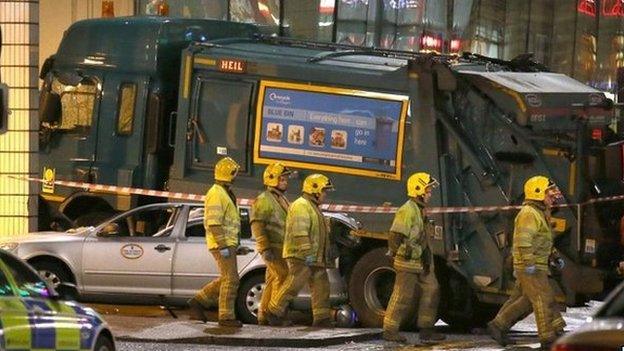Glasgow bin lorry crash: Speed limited reaction time
- Published
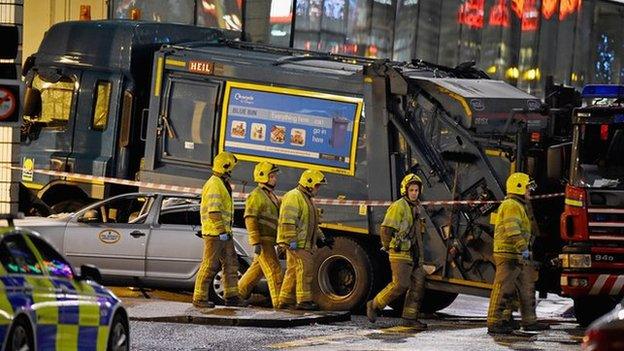
Six people were killed and 10 others injured when the council bin lorry crashed in the centre of Glasgow
The bin lorry which killed six people in Glasgow travelled too quickly for people to react effectively, a fatal accident inquiry (FAI) has heard.
Crash expert Mark Hill told Glasgow Sheriff Court that within 19 seconds, the lorry initially accelerated to 25mph, then dropped to 19mph and 10mph.
He said the lorry crew and pedestrians had as little as five seconds to react as the tragedy unfolded on 22 December.
The inquiry is examining the lorry, its route and driver Harry Clarke's health.
The court previously heard that the 58-year-old driver was unconscious at the wheel as the Glasgow City Council bin lorry went out of control on Queen Street in the city centre, killing six pedestrians and injuring 15 others.
'Short notice'
Mr Hill, a consultant with the Transport Research Laboratory, was giving evidence on the fifth day of the FAI, which is being overseen by Sheriff John Beckett QC.
On Monday, he told the inquiry that the six people who died were killed within 19 seconds.
In his second day of evidence, Mr Hill said the bin lorry initially accelerated as it hit the pavement and pedestrians in front of it would have had "very short notice" to take evasive action.
The witness told the court that the two rear-seated crew members could not have known how long the crash would last.
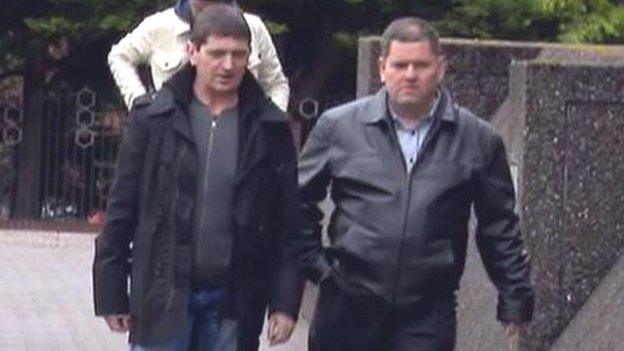
Matthew Telford and Henry Toal were the crew members on the bin lorry
Mr Hill said that when the bin lorry began striking buildings, road signs and pedestrians, this would "confound clear thought" of the crew on board.
The witness told the court that the crew would probably have expected the bin lorry to stop after it crashed into the Virgin Money building.
He said that in the "intense environment" of an ongoing crash, the crew would be likely to revert to "innate" self-preservation.
'Perceived dread'
They would have experienced "perceived dread" - a fear of not being in control of the situation and of suffering serious harm.
Mr Hill said the crew's perception of time could have been distorted as the bin lorry veered out of control, further impacting on their decision-making.
The inquiry has previously heard that the two crewmen, Matthew Telford and Henry Toal, made no attempt to apply the brake and believed they could not reach it.
Neither of the men could drive and they had not been given any training on what to do if a driver fell ill at the wheel.
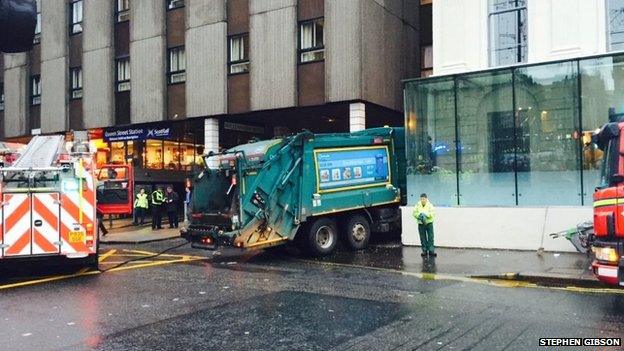
The bin lorry crashed outside Queen Street Station in George Square
Mr Hill's report on the crash said Mr Toal and Mr Telford would have had about five seconds in which to react.
He described Mr Telford's first actions, in trying to rouse the driver Mr Clarke as "logical".
Mr Hill noted that the crew had limited knowledge of driving and were physically constrained by the railing separating them from the front of the cabin.
He said any consideration of how to stop the bin lorry would have required "far more in-depth" knowledge and experience.
The witness said the crew would have had enough reaction time to reach the handbrake but said it was "questionable" if they could have made a decision during the confusion.
'Insufficient time'
Mr Hill also said that engaging the handbrake could potentially have led to other buildings and people being hit.
He concluded that there was "insufficient time" for Mr Toal and Mr Telford to react from detecting the altered course of the bin lorry to it hitting the Millennium Hotel in George Square.
Mr Hill was later cross-examined by Mark Stewart QC, who is representing the bereaved Sweeney and McQuade families.
He noted that parts of Mr Hill's report dealt with the psychological reactions of the crew, yet he was not a psychologist.
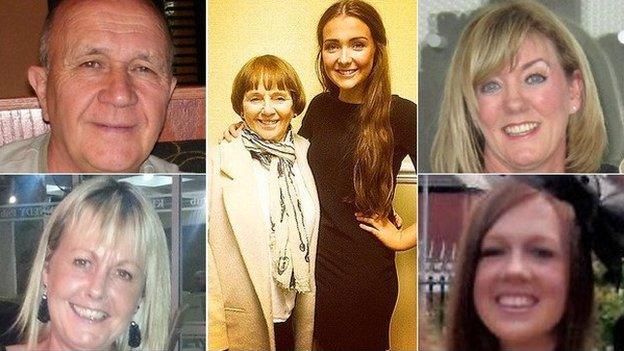
(Clockwise from top left) Jack Sweeney, Lorraine Sweeney, Erin McQuade, Jacqueline Morton, Stephenie Tait and Gillian Ewing were killed in the crash
Mr Stewart noted that there was an incident in Glasgow in 2014 where a bin lorry driver took ill and untrained crew steered the vehicle through a hedge.
Mr Hill, who previously noted that the bin lorry crew were not trained in how to stop the vehicle, agreed that a trained crew could have made "better, informed decisions about how to intervene".
He confirmed, under questioning from Mr Stewart, that a trained crew operating the handbrake could have stopped the bin lorry before it reached the St Vincent Place junction with Queen Street.
The QC then noted that about 2% of road collisions were attributed to a "driver medical event".
"Foreseeable risk"
Mr Hill agreed that, given this statistic, driver medical conditions were a "foreseeable risk".
Under cross-examination from Glasgow City Council's QC, Peter Gray, Mr Hill agreed that "interfering with the handbrake" would be a "last resort", even for a trained crew.
He said that in cases such as this crash, there was "a matter of seconds" to react, and anyone doing so would need a "cool head".
The witness said they would need to make a "calculated decision", as applying the handbrake could lead to "very much worse consequences".
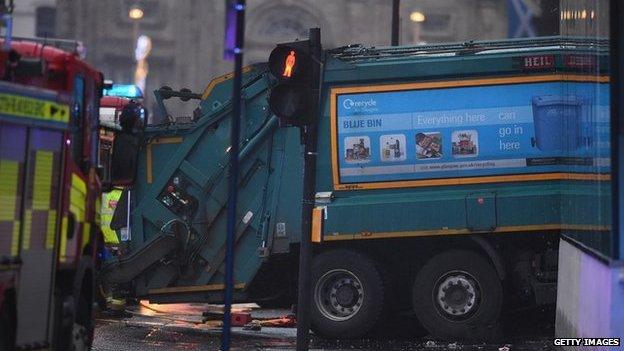
The bin lorry crashed into the Millennium Hotel
Mr Hill agreed with Mr Gray's assertion that any training for such an event would be "very challenging indeed".
The witness said he found no evidence that such training existed, or that there had even been discussion of it or guidance issued from regulators.
Mr Gray then asserted that "expert guidance" would be needed to put together such training and would involve psychologists and crash experts.
Mr Hill said that while he was no training expert, crews would need a far greater knowledge of the workings of a bin lorry under such a training scheme.
'Serious consideration'
The QC then concluded his cross-examination by saying that while training was "a positive thing" it also had "to be practical" and any employer offering such advanced training would have to give "serious consideration" to the qualifications of bin lorry crew.
Liam Ewing, the representative of the bin lorry's two rear-seated crewmen, Mr Telford and Mr Toal, also cross examined Mr Hill.
He highlighted a previous Glasgow City Council bin lorry crash when the vehicle went into a garden after the driver fainted.
Mr Ewing noted that this incident was "quite dissimilar" from the George Square crash in that the lorry was going at low speed and the driver was alone in the cab.
Mr Hill then agreed that the crew on board the George Square lorry would have been aware it was speeding up and would have had a limited view from their rear seats.
He also agreed that they would have been in danger of hitting the windscreen if they had attempted to apply the handbrake without wearing a seatbelt.
Erin McQuade, 18, her grandparents Jack Sweeney, 68, and his 69-year-old wife Lorraine, all from Dumbarton, died in the incident in the city's Queen Street and George Square.
Stephenie Tait, 29, and Jacqueline Morton, 51, both from Glasgow, and Gillian Ewing, 52, from Edinburgh, were also killed when the truck mounted the pavement before crashing into the side of the Millennium Hotel.
A further 15 people were injured.
The Crown Office has already concluded that there will be no criminal prosecution over the crash, with senior lawyers deeming it a "tragic accident".
- Published28 July 2015
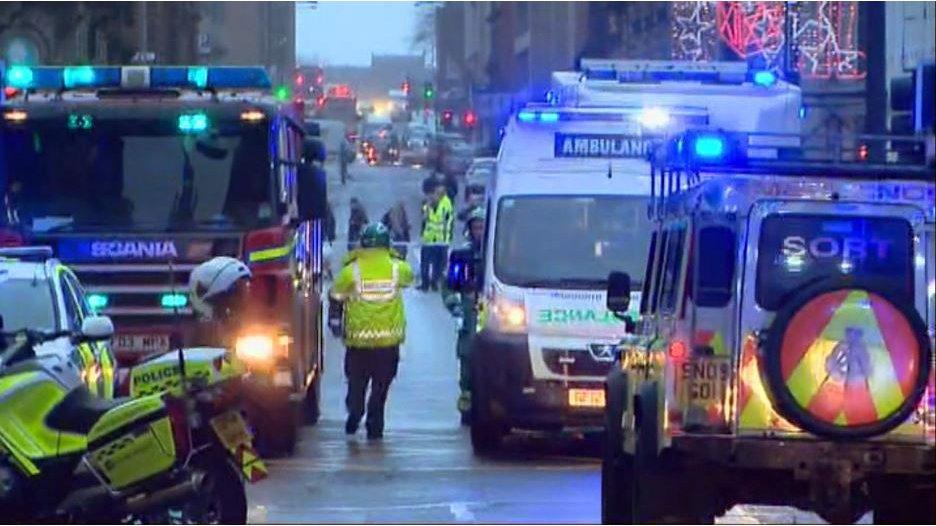
- Published27 July 2015

- Published24 July 2015

- Published23 July 2015
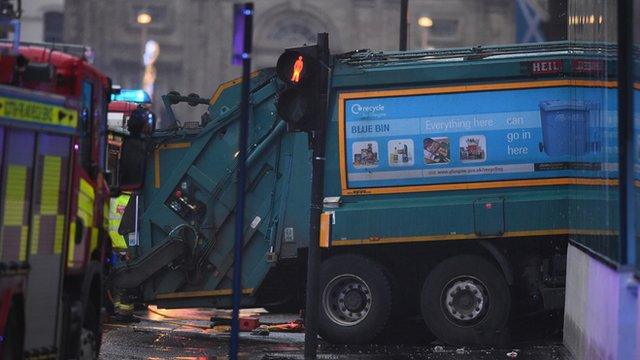
- Published18 June 2015
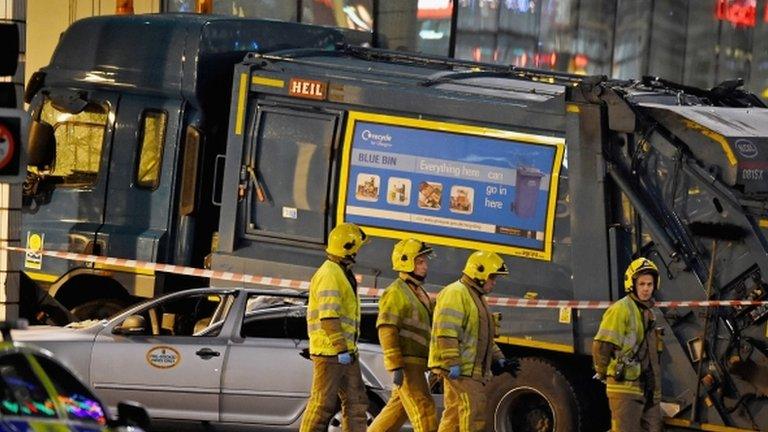
- Published25 February 2015
